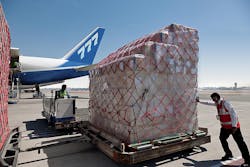Boeing Commercial Airplanes issued a 20-year forecast for the important air-cargo sector, foreseeing demand for over 2,600 freighters through 2037 as global freight traffic rises at a predicted 4.2% annual rate. In terms of aircraft, Boeing’s World Air Cargo Forecast anticipates 980 new medium and large freighters and 1,670 converted freighters will replace older airplanes as well as expand the global fleet.
More specifically, it sees the worldwide fleet of air-freight jets expanding by over 70%, from the current 1,870 to 3,260 aircraft by 2037. Deliveries of new cargo aircraft would be valued at $280 billion over that period.
"The air-cargo market continues to be a major element of commercial aviation's growth story," stated managing director Darren Hulst, of the OEM’s Market Analysis & Sales Support unit. "Our new forecast indicates strong long-term air-cargo trends, which coincide with the market recovery that we have seen over the last few years across Europe, North America, and Asia."
Two notable factors driving growth in the air-cargo sector are the Chinese air-express market in China and the global increase in e-commerce, the latter of which is seen expanding 20% per year in the near-term, to almost $5 trillion by 2021.
Also, demand for regional express services in what Boeing describes as “fast-developing economies” will increase the portion of standard-body air-cargo jets from 37% to 39% of the global fleet.
Beyond this, 1,170 standard-body and 500 medium wide-body passenger airplanes will be converted into freighters through the period of the study.
Air-freighter models (e.g., 747-8 and 777-F widebodies) will continue to carry over 50% of all air cargo, it concluded.
